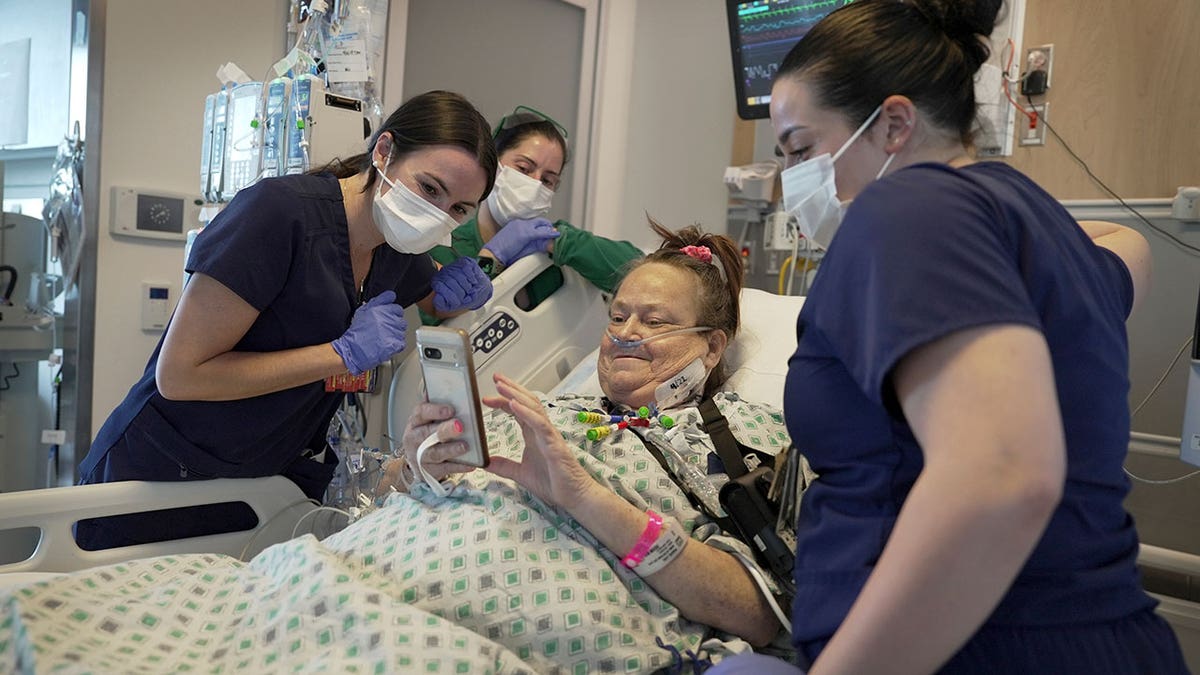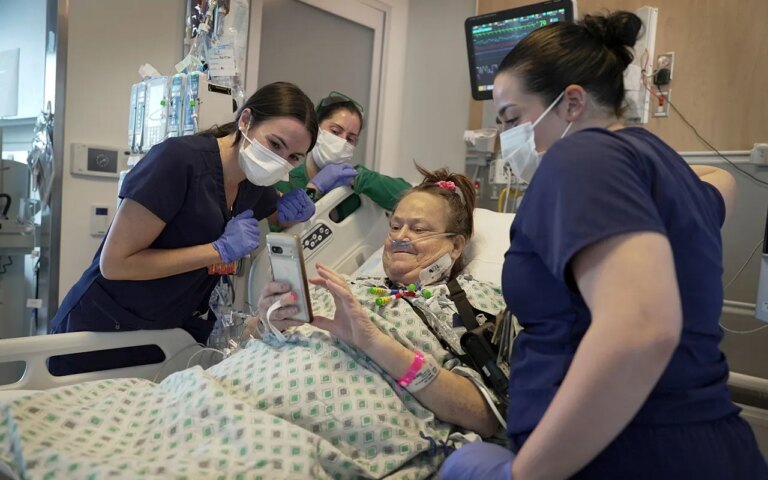- Lisa Pisano faced heart and kidney failure, making her ineligible for traditional transplants, but a pioneering procedure at NYU Langone Health offered her hope.
- Doctors implanted a mechanical heart pump to stabilize Pisano’s failing heart, followed by a kidney transplant from a genetically modified pig.
- Pisano’s recovery is progressing well, marking a significant advance in animal-human transplantation.
Doctors transplanted a pig kidney into a New Jersey woman who was on the verge of death, amid a series of dramatic surgeries that also stabilized her failing heart.
Lisa Pisano’s combination of heart and kidney failure left her too sick to qualify for a traditional transplant and without options. Then doctors at NYU Langone Health came up with a new one-two punch: implanting a mechanical pump to keep his heart beating and a few days later, transplanting a kidney from a genetically modified pig.
Pisano is recovering well, the NYU team announced Wednesday. She is only the second patient to receive a pig kidney – following a historic transplant last month at Massachusetts General Hospital – and the latest in a series of attempts to make animal-to-human transplantation a reality .
MASSACHUSETTS MAN, BENEFICIARY OF FIRST SUCCESSFUL PIG KIDNEY TRANSPLANT, RELEASED FROM HOSPITAL
This week, the 54-year-old grabbed a walker and took her first steps.

Lisa Pisano looks at photos of her dog after her surgeries at NYU Langone Health in New York on April 22, 2024. Doctors transplanted a pig kidney into Pisano, who was near death, as part of a pair of dramatic surgeries that also included a fix for his failing heart. (AP Photo/Shelby Lum)
“I was at the end of my rope,” Pisano told the Associated Press. “I just took a chance. And you know, worst case scenario, if it didn’t work for me, it might have worked for someone else and it might have helped the next person.”
Dr. Robert Montgomery, director of the NYU Langone Transplant Institute, recounted the cheers in the operating room when the organ immediately began producing urine.
“It’s been transformative,” Montgomery said of the experiment’s early results.
But “we’re not out of the woods yet,” warned Dr. Nader Moazami, the NYU heart surgeon who implanted the heart pump.
“Thanks to this surgery, I can see my wife smiling again,” Pisano’s husband, Todd, said Wednesday.
Other transplant experts closely monitor the patient’s progress.
“I have to congratulate them,” said Dr. Tatsuo Kawai of Mass General, who noted that his own pig kidney patient was healthier overall at the start of his surgery than NYU’s. “When heart function is poor, it is very difficult to perform a kidney transplant.”
THE QUEST FOR THE PIG ORGAN
More than 100,000 people are present United States the transplant waiting list, most need a kidney and thousands die waiting. Hoping to fill the shortage of organ donations, several biotechnology companies are genetically modifying pigs so that their organs are more like those of humans and less likely to be destroyed by humans’ immune systems.
NYU and other research teams have temporarily transplanted pig kidneys and hearts into brain-dead cadavers, with promising results. Then the University of Maryland transplanted pig hearts into two men who were out of other options, and both died within months.
Mass General’s pig kidney transplant last month raised new hopes. Kawai said Richard “Rick” Slayman had an early rejection scare, but rebounded enough to return home earlier this month and was still doing well five weeks after the transplant. A recent biopsy showed no other problems.
A COMPLEX CASE AT NYU
Pisano is the first woman to receive a pig organ – and unlike previous xenotransplantation experiments, her heart and kidneys were failing. She suffered a cardiac arrest and had to be resuscitated before the experimental surgeries. She had become too weak to play with her grandchildren. “I was unhappy,” the Cookstown, New Jersey, woman said.
Heart failure made her ineligible for a traditional kidney transplant. But while on dialysis, she also didn’t qualify for a heart pump, called a left ventricular assist device or LVAD.
“It’s like being in a maze and you can’t find a way out,” Montgomery said – until surgeons decided to combine a heart pump with a pig kidney.
TWO OPERATIONS IN EIGHT DAYS
With emergency authorization from the Food and Drug Administration, Montgomery chose an organ from a genetically modified pig by United Therapeutics Corp. so that its cells do not produce particular sugars foreign to the human body and triggering immediate rejection of the organ.
More of an adjustment: The donor pig’s thymus, which drives the immune system, was attached to the donated kidney in hopes that it would help Pisano’s body tolerate the new organ.
CLICK HERE TO GET THE FOX NEWS APP
Surgeons implanted the LVAD to power Pisano’s heart on April 4 and transplanted pork kidney on April 12. There is no way to predict her long-term outcome, but she has shown no signs of organ rejection so far, Montgomery said. And by adjusting the LVAD to work with his new kidney, Moazami said doctors have already learned lessons that could make future care of heart and kidney patients easier.
Special “compassionate use” experiments are very instructive for doctors, but it will take rigorous studies to prove whether xenotransplantations actually work. What happens with Pisano and the Mass General kidney recipient will undoubtedly influence the FDA’s decision to authorize such trials. United Therapeutics said it hopes to start one next year.


